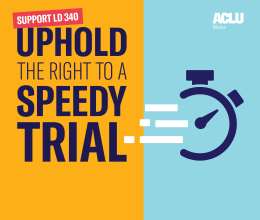In response to the Governor’s recent proposal to amp up the failed War on Drugs by adding 14 new law enforcement positions, 4 new assistant attorney positions dedicated specifically to drug crimes, and four new district court judges that would exclusively hear and decide drug-related cases - there has been some discussion about also expanding the availability of drug courts here in Maine.
While drug courts are often held up a progressive alternative to incarceration for drug crimes, in practice, research has shown they do not decrease criminal justice involvement - and actually making the system more punitive towards drug addiction. Additionally they raise significant constitutional concerns around due process and privacy.
Drug courts, were first established in the 1980s, during the height of the War on Drugs. Amidst skyrocketing drug arrests, prisons and jails became increasingly overcrowded. Drug courts were seen as an alternative means to leverage the power of the court system to coerce defendants into treatment programs and manage the rapidly expanding criminal justice system. In 1994 there were twelve drug courts operating throughout the United States. By 2004 there were 1621.
In Maine, drug courts are currently operating in 6 counties. When a person is charged in a drug related offense within that jurisdiction, their case may be referred to the local drug court. Following an examination of the defendant’s history and “level of substance abuse” it is determined whether that individual would be a good candidate for the program. If yes, the prosecutor contacts the defense counsel to offer a plea agreement. Often upon successful completion of the drug court program, the charges will be removed from the defendant's record. However, if the defendant fails, they will be charged and serve an agreed upon sentence. The defendant then signs in open court the plea agreement, a waiver of rights, bail/entry contract and release form for waiver of confidential substance abuse treatment information to be shared with the drug court team members.
The defendant then begins an intensive supervision program overseen by a team composed of a judge, a drug court case manager, a substance abuse treatment provider, a probation officer, the prosecutor, the individual’s defense attorney and law enforcement officers. Not only is the participant required to enter and attend treatment, they must abstain from all alcohol and non-prescription drug use, submit to random drug tests, have daily phone contact and weekly attendance with the Adherence Case Manager, have frequent meetings with probation and law enforcement officers, have weekly appearance before a drug court judge, have travel constraints and curfew, must attend weekly self-help meetings (AA and NA) and maintain gainful employment or participate in an approved educational program.
All noncompliance with the drug court program is met with immediate sanctions by the judge, which can include a term of incarceration in response to violations. If it is determined that the individual has “failed” the person may be ejected from drug court and will serve the alternative sentence laid out in the plea agreement.
As we have blogged about extensively, drug abuse is first and foremost a public heath issue. Substance abuse disorders are a disease that require health-based treatment. Drug addiction particularly, can change the very chemicals in a person’s brain making overcoming the addiction a life-long challenge. With forty years of hindsight, the evidence is clear: the criminal justice system is not only a harmful but also ineffective way to address substance abuse in America.While drug courts recognize that individuals suffering from drug addiction would be better served in treatment programs than in prison, they are structural still rooted within the purview of the criminal justice system and rely on punitive sanctions for non-compliance.
Perhaps most harmful though, while drug courts are often sold as a way to reduce the rate of criminal justice involvement among those suffering from drug addiction, research has shown that they actually may increase the time a person spends behind bars – fueling rather than decreasing our the rate of criminal justice involvement. Participants that fail a drug test or miss an appointment are often subject to periods of incarceration as a sanction. While relapse is often considered a part of the recovery process, drug courts continue to penalize it with incarceration and often can eject someone from the program who is not able to abstain from drug use for a period of time deemed appropriate by a judge – who under most circumstances does not have medical training. Unlike health-centered programs, drug courts treat as secondary all other measures of improved health and stability, including reduced drug use and maintenance of relationships and employment.
Those that fail the drug court program – about 40% in Maine – often face a longer sentence than those who did not enter into the program - as in exchange for entrance into the program they lost the opportunity to further negotiate the terms of the plea agreement.
In addition to making the criminal justice system more punitive towards drug addiction, drug courts also raise serious constitutional concerns related to due process and privacy. As mentioned above, in Maine in order to be referred to the drug court program by the prosecutor, the defendant must enter a guilty plea. This puts the defendant in the position of choosing between receiving treatment and exercising their constitutional right to a trial and due process, greatly increasing the power of the prosecutor to compel a plea agreement.
Secondly, drug court participants in Maine are required to sign a waiver that allows disclosure of medical information related to substance abuse treatment to all members of “drug court team” – composed of a judge, law enforcement, prosecutors etc. This raises significant concerns around an individual’s right to privacy in personal medical information. This is particularly acute in small communities, where that individual is likely to have future interaction with these actors.
There is no doubt that Maine’s rising rates of drug addiction are cause for concern and action. However, rather than funneling scarce resources into more courts, law enforcement and our prisons and jails, we need to invest in treatment. According to a 2010-2011 National Survey of Drug Use and Health, less than a quarter of Maine's population currently grappling with substance abuse received any treatment. Since 2010, the number of people seeking treatment for opiate addiction has increased by 15%, however funding for treatment was decreased by 7%. More courts and mechanisms to punish people for the their addiction is not the answer. Instead it's time to take a smarter, more compassionate approach that recognizes and treats drug use as a public health issue.
Update: We have heard feedback from some readers that drug courts deserve more credit than we give them. While we agree that in some states, drug courts may be the most viable way to divert people from prison, we don't believe more drugs courts is the answer for Maine. Rather, in this state we aim to achieve a model that keeps more people out of the criminal justice system all together.








